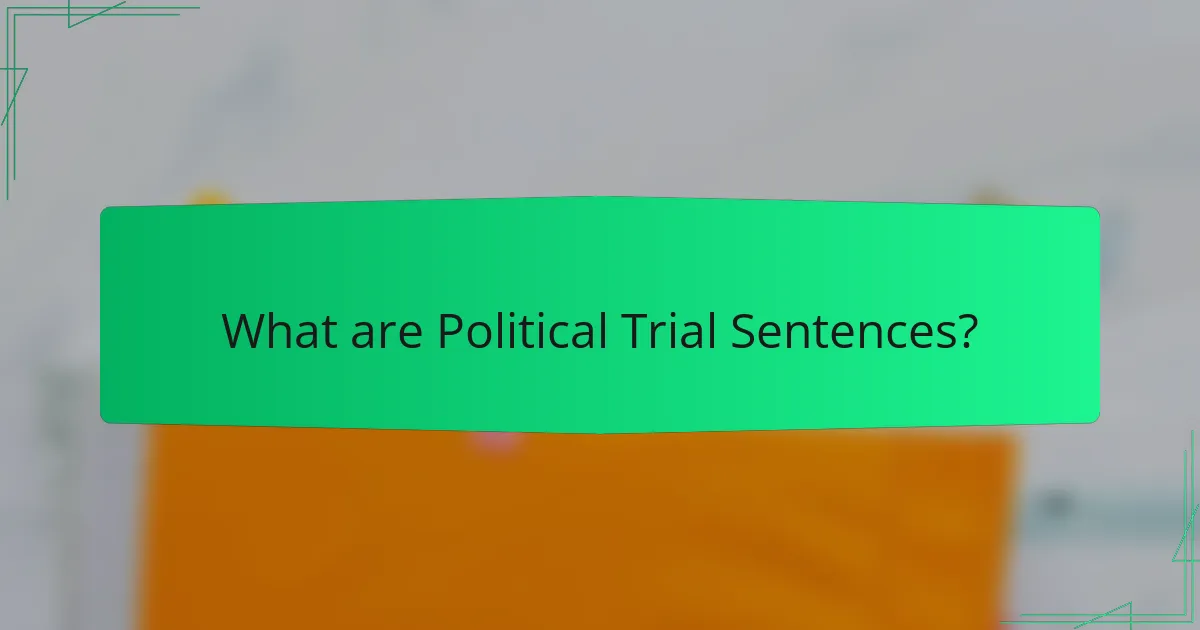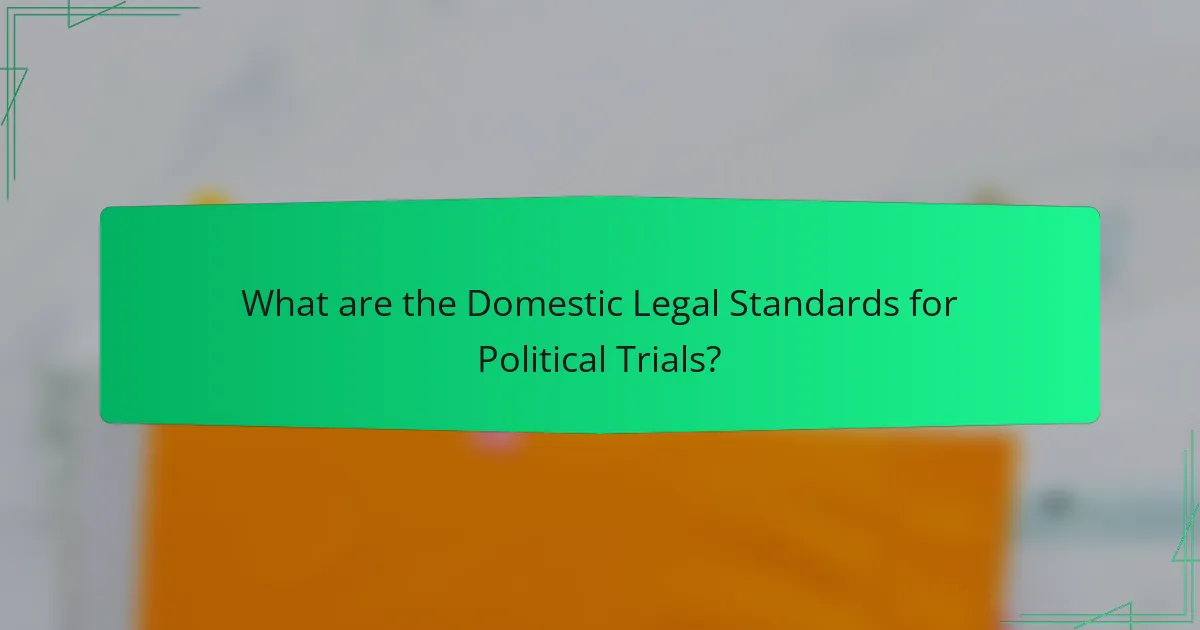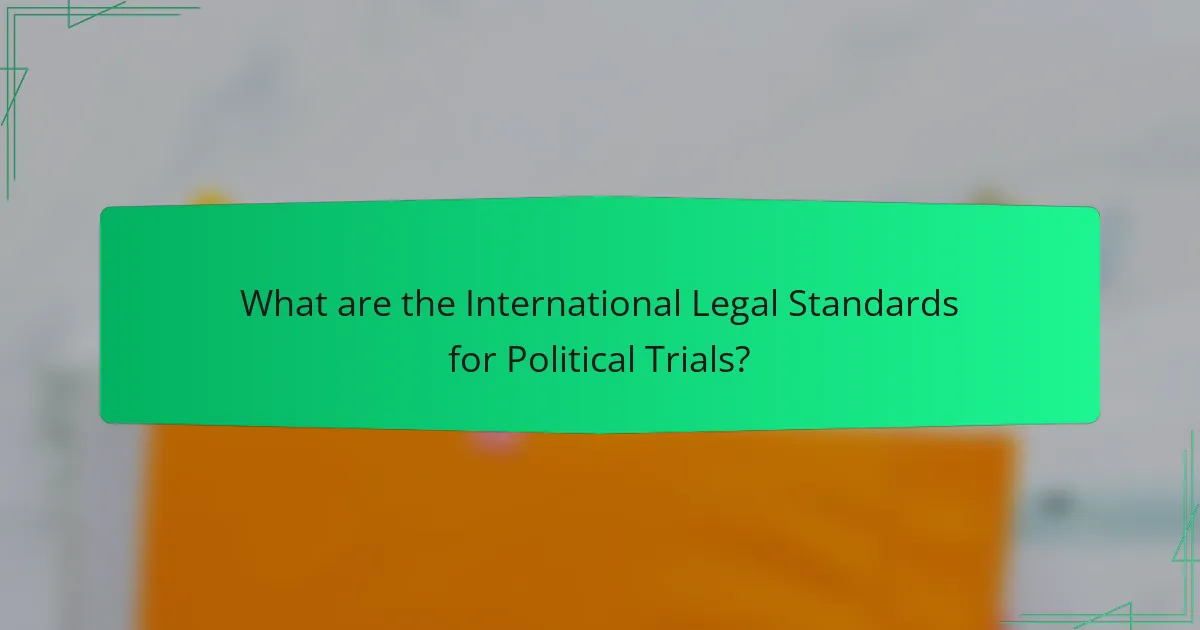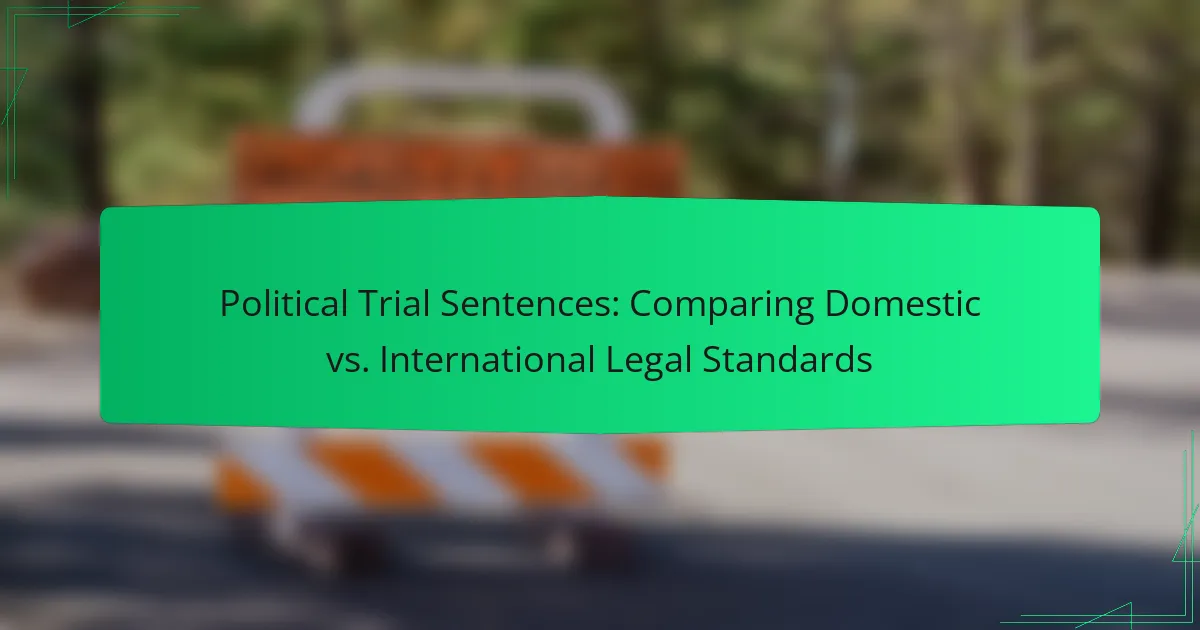Political trial sentences are legal penalties imposed on individuals based on their political beliefs or actions, often occurring in authoritarian regimes where dissent is suppressed. These trials frequently lack fundamental legal protections, such as fair representation and impartiality, and are criticized for violating justice and human rights. The article examines the differences between domestic and international legal standards regarding political trials, highlighting the principles of fair trial rights, due process, and impartiality as outlined in various international treaties. It also emphasizes the importance of adhering to these standards for maintaining legitimacy and public trust in judicial systems.

What are Political Trial Sentences?
Political trial sentences are legal penalties imposed following trials that are politically motivated. These sentences often target individuals for their political beliefs or actions rather than for legitimate criminal conduct. The trials may lack standard legal protections, such as fair representation and impartiality. In many cases, political trial sentences arise in authoritarian regimes where dissent is suppressed. Historical examples include political prisoners sentenced under laws that disproportionately affect opposition figures. Such sentences are often criticized for undermining justice and human rights. International legal standards typically reject the legitimacy of these trials, advocating for fair trial rights and due process.
How do Political Trial Sentences differ from regular trial sentences?
Political trial sentences differ from regular trial sentences primarily in their motivations and legal frameworks. Political trials often arise from actions deemed threatening to the state or government. These sentences may reflect political agendas rather than impartial justice. In contrast, regular trial sentences are typically based on established legal standards and evidence presented in court. Political trials can involve expedited procedures and limited rights for defendants. For instance, in many countries, political defendants may face harsher penalties or lack access to fair representation. Historical examples include the trials during the Stalinist purges, where outcomes were predetermined to eliminate opposition. Regular trials, however, generally uphold principles of due process and fairness as mandated by law.
What are the defining characteristics of Political Trial Sentences?
Political trial sentences are characterized by their focus on politically motivated charges. These sentences often arise in contexts where the judiciary is influenced by political powers. They typically lack due process, undermining fair trial standards. Evidence in such trials may be fabricated or coerced. Sentences can be disproportionately harsh compared to the alleged offenses. Political trial sentences often target dissenters or opposition figures. They may serve to suppress political opposition or dissent. Historical examples include trials during authoritarian regimes, where legal standards are frequently disregarded.
Why are Political Trial Sentences controversial?
Political trial sentences are controversial due to concerns over fairness and impartiality. These trials often lack transparency and can be influenced by political agendas. Critics argue that such sentences undermine the rule of law. Historical examples, like the trials during the Nuremberg process, highlight the complexities involved. Many argue that political motivations can lead to biased outcomes. This raises questions about the legitimacy of the legal process. Additionally, international legal standards often clash with domestic practices. The differences in legal frameworks can exacerbate the controversy surrounding these sentences.
What are the implications of Political Trial Sentences on society?
Political trial sentences significantly impact society by influencing public trust in the judicial system. These sentences can lead to perceptions of political bias and injustice. When the legal process is perceived as politically motivated, it undermines the rule of law. This can result in decreased civic engagement and increased polarization among citizens. Historical examples, such as the trials during the McCarthy era in the United States, illustrate how political trials can create an atmosphere of fear and repression. Additionally, political trial sentences may provoke protests and civil unrest, as seen in various countries where dissent is criminalized. Ultimately, these implications reflect broader societal tensions and the fragility of democratic institutions.
How do Political Trial Sentences affect public opinion?
Political trial sentences significantly influence public opinion. Sentences can shape perceptions of justice and accountability. For instance, harsh sentences may lead to public outrage and protests. Conversely, lenient sentences might foster feelings of injustice. Historical examples include the trials of political leaders like former South Korean President Park Geun-hye. Her conviction led to widespread public support for anti-corruption measures. Research shows that public trust in institutions often declines after perceived unfair trials. This highlights the critical link between political trial outcomes and public sentiment.
What role do Political Trial Sentences play in governance?
Political trial sentences serve as tools for political control within governance. They can suppress dissent and maintain the ruling party’s power. These sentences often target opposition figures or activists. By imposing harsh penalties, governments deter others from opposing them. This practice undermines democratic principles and the rule of law. Historical examples include political trials in authoritarian regimes. Such trials often lack transparency and fair legal processes. This creates an environment of fear among the populace. Political trial sentences significantly impact the political landscape and governance structures.

What are the Domestic Legal Standards for Political Trials?
Domestic legal standards for political trials vary by country. They often include provisions for fair trial rights. These rights typically encompass the right to legal representation. Additionally, defendants may have the right to present evidence. Transparency in proceedings is also a common requirement. Many jurisdictions mandate that trials be conducted in a timely manner. Some countries have specific laws governing political offenses. The adherence to these standards is crucial for legitimacy and public trust.
How do different countries define Political Trial Sentences?
Different countries define political trial sentences based on their legal frameworks and political contexts. In authoritarian regimes, such sentences often serve to suppress dissent. For example, in countries like Belarus, political trials may lack due process and are used to silence opposition. In contrast, democratic nations often have legal standards that protect individuals from politically motivated prosecutions. For instance, in Germany, political trial sentences must adhere to constitutional protections and fair trial standards. The United Nations has also established guidelines emphasizing the importance of due process in political trials. These definitions reflect the broader context of human rights and the rule of law in various jurisdictions.
What legal frameworks govern Political Trials in domestic jurisdictions?
Legal frameworks governing political trials in domestic jurisdictions vary by country. They typically include constitutional provisions, criminal law, and specific statutes addressing political offenses. Many nations have laws ensuring fair trial rights, such as the right to legal representation and the presumption of innocence. International human rights treaties, like the International Covenant on Civil and Political Rights, also influence these frameworks. In some countries, political trials may be subject to military or emergency laws, which can alter standard legal procedures. Historical examples, such as the Nuremberg Trials, highlight the complexities of legal frameworks in political contexts.
How do domestic legal standards ensure fairness in Political Trials?
Domestic legal standards ensure fairness in political trials by establishing clear procedural rules and protections for defendants. These standards often include the right to legal representation, ensuring that defendants can adequately defend themselves. Additionally, many jurisdictions require impartial judges who must remain neutral throughout the trial process.
The presumption of innocence is a fundamental principle in domestic legal systems, meaning defendants are considered innocent until proven guilty. Transparency in court proceedings is also mandated, allowing public scrutiny to deter potential biases.
Moreover, appeals processes are typically available, enabling defendants to challenge convictions or sentences that may be unjust. The inclusion of jury trials in some systems allows for community involvement in the judicial process, further promoting fairness.
Empirical studies, such as those conducted by the International Commission of Jurists, highlight that adherence to these standards significantly impacts the perceived legitimacy of political trials.
What are the common challenges faced in Domestic Political Trials?
Common challenges faced in domestic political trials include issues of impartiality, legal representation, and public perception. Impartiality is often compromised due to political influence on the judiciary. Legal representation can be inadequate, limiting defendants’ ability to present their cases effectively. Public perception may skew towards bias, impacting the trial’s fairness. Additionally, evidence may be politically motivated or unreliable. These factors can lead to unjust outcomes, as seen in various historical cases where political trials reflected the ruling party’s agenda rather than true justice.
How do political biases influence trial outcomes?
Political biases can significantly influence trial outcomes by affecting juror perceptions and judicial decisions. Jurors may hold preconceived notions based on their political beliefs. These biases can lead to favoritism towards one party in a trial. Judges may also exhibit biases, consciously or unconsciously, affecting their rulings. Research indicates that politically charged cases often see skewed verdicts. For instance, studies show that jurors are more likely to convict defendants from opposing political backgrounds. In politically sensitive cases, public opinion can sway judicial behavior. This influence complicates the pursuit of impartial justice in trials.
What are the legal recourses available for defendants in Domestic Political Trials?
Defendants in domestic political trials have several legal recourses available to them. They can appeal the verdicts or sentences in higher courts. This process often involves presenting new evidence or challenging the legal basis of the original trial. Defendants may also seek to file motions for a retrial based on procedural errors. Additionally, they can request judicial review of the trial process to ensure compliance with legal standards. Legal representation is crucial for navigating these recourses effectively. In some jurisdictions, defendants can also seek remedies through international human rights mechanisms if domestic options are exhausted. These recourses are essential for protecting the rights of defendants in politically sensitive cases.

What are the International Legal Standards for Political Trials?
International legal standards for political trials include principles of fair trial, due process, and impartiality. These standards are outlined in various international treaties. The International Covenant on Civil and Political Rights (ICCPR) establishes the right to a fair trial in Article 14. This includes the presumption of innocence and the right to legal counsel. The United Nations Basic Principles on the Independence of the Judiciary emphasize the need for judges to be free from external pressures. Additionally, the European Convention on Human Rights ensures the right to a fair hearing in Article 6. These frameworks aim to protect individuals from arbitrary detention and ensure justice in political cases.
How do International Legal Standards address Political Trials?
International legal standards address political trials by emphasizing fair trial rights and due process. These standards are outlined in instruments such as the International Covenant on Civil and Political Rights (ICCPR). The ICCPR mandates that all individuals are entitled to a fair hearing by a competent, independent, and impartial tribunal. Additionally, Article 14 of the ICCPR specifically addresses the right to defend oneself and the presumption of innocence.
Furthermore, international legal frameworks prohibit arbitrary detention and ensure access to legal counsel. The UN Basic Principles on the Independence of the Judiciary also stress the importance of judicial independence in political trials. These principles collectively aim to protect individuals from politically motivated prosecutions.
In practice, international bodies like the International Criminal Court (ICC) monitor compliance with these standards. They assess whether political trials adhere to the principles of justice and fairness. Violations of these standards can lead to international condemnation and sanctions against the offending state.
What treaties and conventions govern Political Trials globally?
The primary treaties and conventions governing political trials globally include the International Covenant on Civil and Political Rights (ICCPR) and the European Convention on Human Rights (ECHR). The ICCPR, adopted in 1966, outlines the rights of individuals in judicial proceedings. It emphasizes fair trial rights and protections against arbitrary detention. The ECHR, established in 1953, similarly ensures fair trial guarantees and prohibits torture and inhumane treatment. Additional instruments include the African Charter on Human and Peoples’ Rights and the American Convention on Human Rights. These treaties collectively promote international legal standards for political trials, establishing frameworks for due process and human rights protections.
How do International Legal Standards promote human rights in Political Trials?
International legal standards promote human rights in political trials by establishing guidelines that protect individual rights and ensure fair proceedings. These standards include principles such as the right to a fair trial, the presumption of innocence, and the prohibition of arbitrary detention. They are articulated in documents like the International Covenant on Civil and Political Rights (ICCPR). The ICCPR mandates that all individuals have the right to a public hearing by a competent, independent, and impartial tribunal. This framework helps prevent abuses of power in politically motivated trials. Moreover, international legal standards provide mechanisms for accountability, allowing for the review of domestic legal systems. These standards are enforced by international bodies such as the United Nations Human Rights Committee, which monitors compliance and addresses violations. This oversight enhances the protection of human rights in political trials globally.
What are the key differences between Domestic and International Legal Standards?
Domestic legal standards are laws and regulations that operate within a specific country. They are created by national legislatures and enforced by domestic courts. Domestic standards vary significantly from one nation to another. They reflect the cultural, social, and political contexts of the country.
International legal standards, on the other hand, are agreements and treaties that govern relations between countries. These standards are established through international organizations like the United Nations. They aim to create a consistent framework for addressing global issues.
One key difference is jurisdiction. Domestic laws apply within a nation’s borders, while international laws apply across multiple countries. Enforcement mechanisms also differ. Domestic laws are enforced by national authorities, while international laws rely on cooperation between states.
Additionally, domestic legal standards may prioritize national interests. In contrast, international legal standards often emphasize human rights and global cooperation. This difference can lead to conflicts when domestic laws contradict international obligations.
Such distinctions are crucial in political trial sentences. Courts must consider both domestic and international standards when adjudicating cases that involve international law. This dual consideration can impact the fairness and legality of political trials.
How do enforcement mechanisms differ between domestic and international contexts?
Enforcement mechanisms differ significantly between domestic and international contexts. Domestic enforcement relies on national laws and institutions to implement legal decisions. National courts have the authority to enforce laws within their jurisdiction. They can impose penalties, including fines or imprisonment, based on local statutes. In contrast, international enforcement mechanisms often lack direct authority. International law relies on treaties and agreements between states. Compliance is largely voluntary, as there is no overarching global authority to enforce laws. For example, the International Criminal Court can issue warrants but must rely on member states for arrest and extradition. This dependence on state cooperation illustrates the challenges of enforcing international law.
What impact do these differences have on trial outcomes?
Differences in legal standards significantly impact trial outcomes. Domestic legal standards often prioritize national interests, potentially leading to biased verdicts. In contrast, international legal standards emphasize human rights and fair trial principles. This divergence can affect the impartiality of judges and juries. For example, in domestic trials, political pressure may influence decisions. International trials, however, are generally subject to oversight by global institutions. Consequently, defendants in international trials may receive more equitable treatment. Studies show that adherence to international standards correlates with higher rates of fair trial outcomes. Therefore, the differences in legal frameworks directly shape the justice received by defendants.
What best practices can be adopted for fair Political Trials?
Best practices for fair political trials include ensuring judicial independence. This prevents external influence on trial outcomes. Transparent proceedings are essential to maintain public trust. All parties should have access to legal representation. Adequate time must be given for defense preparation. Evidence must be collected lawfully and presented fairly. Impartial judges should oversee the trial process. International human rights standards should guide trial procedures. These practices align with the principles outlined in the Universal Declaration of Human Rights.
How can transparency be ensured in Political Trials?
Transparency in political trials can be ensured through several key measures. First, open court proceedings allow public access to the trial process. This openness helps maintain accountability and trust in the judicial system. Second, independent oversight bodies can monitor trials to ensure compliance with legal standards. These bodies can report on trial conduct and findings. Third, clear communication of legal rights and procedures to all parties involved promotes understanding. This clarity reduces the potential for manipulation or confusion. Fourth, the use of technology, such as live streaming, can enhance accessibility. This allows broader public engagement with the trial process. Finally, adherence to established international legal standards, such as those outlined by the International Covenant on Civil and Political Rights, provides a framework for transparency. These standards emphasize the right to a fair trial and public hearings.
What role does public engagement play in improving Political Trial standards?
Public engagement plays a crucial role in improving political trial standards. It enhances transparency and accountability in legal processes. Engaged citizens can advocate for fair trial rights. This advocacy can lead to reforms in legal frameworks. Increased public awareness often pressures governments to adhere to international standards. For instance, public protests have historically influenced legal reforms in various countries. Studies show that nations with higher public engagement often report better adherence to judicial standards. This engagement fosters a culture of respect for human rights and due process.
Political trial sentences are legal penalties imposed in politically motivated trials, often lacking fair representation and due process. This article examines the differences between political trial sentences and regular trial sentences, highlighting their defining characteristics and the controversies surrounding them. It also explores the implications of these sentences on society, public opinion, and governance, while comparing domestic and international legal standards that govern such trials. Key challenges faced in domestic political trials, as well as best practices for ensuring fairness and transparency, are discussed to provide a comprehensive understanding of the legal frameworks involved.


